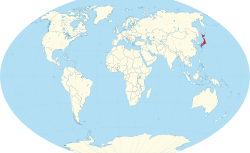Biology:Nuphar × saijoensis
| Nuphar × saijoensis | |
|---|---|
| Scientific classification | |
| Kingdom: | Plantae |
| Clade: | Tracheophytes |
| Clade: | Angiosperms |
| Order: | Nymphaeales |
| Family: | Nymphaeaceae |
| Genus: | Nuphar |
| Species: | N. × saijoensis
|
| Binomial name | |
| Nuphar × saijoensis (Shimoda) Padgett & Shimoda[1]
| |

| |
| Nuphar × saijoensis is endemic to Japan[1] | |
| Synonyms[1] | |
| |
Nuphar × saijoensis is a species of rhizomatous aquatic plant endemic to Japan.[1] It is a natural hybrid of Nuphar japonica and Nuphar pumila,[1][2] or Nuphar japonica and Nuphar pumila subsp. oguraensis.[3][4][5][6]
Description
Generative characteristics
The anthers are strongly recurved.[7]
Reproduction
Generative reproduction
It is fertile, but only very few, mostly unviable seeds are produced with an average of 29 seeds per fruit.[5]
Taxonomy
Publication
It was first described as the variety Nuphar japonica var. saijoensis Shimoda by Michiko Shimoda in 1991. Later, it was treated as the natural hybrid Nuphar × saijoensis (Shimoda) Padgett & Shimoda published by Donald Jay Padgett and Michiko Shimoda in 2002.[1]
Type specimen
The type specimen was collected by Michiko Shimoda in Higashi-hiroshima City, Hiroshima Prefecture, Japan on the 27th of June 1989.[7]
Natural hybridisation
Different sources list different species involved, depending on the recognition of Nuphar taxa. Nuphar japonica is listed as a parental species in all sources.[4][5][1][2] The other parental species is either listed as Nuphar oguraensis (syn. Nuphar pumila subsp. oguraensis),[3][4][5] or as Nuphar pumila.[1][2] In the original publication the second parental species Nuphar oguraensis is listed as Nuphar pumila subsp. oguraensis.[5]
Conservation
Ecology
Habitat
It only occurs in aquatic habitats, such as irrigation ponds, of the Saijo Basin, western Japan.[4][3][7]
References
- ↑ 1.0 1.1 1.2 1.3 1.4 1.5 1.6 1.7 "Nuphar × saijoensis (Shimoda) Padgett & Shimoda" (in en). Royal Botanic Gardens, Kew. http://www.plantsoftheworldonline.org/taxon/77089495-1. Retrieved 27 January 2024.
- ↑ 2.0 2.1 2.2 USDA, Agricultural Research Service, National Plant Germplasm System. 2024. Germplasm Resources Information Network (GRIN Taxonomy). National Germplasm Resources Laboratory, Beltsville, Maryland. URL: https://npgsweb.ars-grin.gov/gringlobal/taxon/taxonomydetail?id=420213. Accessed 27 January 2024.
- ↑ 3.0 3.1 3.2 Shiga, T., & Kadono, Y. (2007). Natural hybridization of the two Nuphar species in northern Japan: Homoploid hybrid speciation in progress?. Aquatic botany, 86(2), 123-131.
- ↑ 4.0 4.1 4.2 4.3 4.4 Padgett, D. J., Shimoda, M., Horky, L. A., & Les, D. H. (2002). "Natural hybridization and the imperiled Nuphar of western Japan." Aquatic Botany, 72(2), 161-174.
- ↑ 5.0 5.1 5.2 5.3 5.4 5.5 植物地理, & 分類研究. (2002). "Seed production and germination in endangered Nuphar (Nymphaeaceae) of western Japan." Journal of Phytogeography and Taxonomy, 50, 35-40.
- ↑ Kondo, T., Watanabe, S., Shiga, T., & Isagi, Y. (2016). "Microsatellite markers for Nuphar japonica (Nymphaeaceae), an aquatic plant in the agricultural ecosystem of Japan." Applications in Plant Sciences, 4(12), 1600082.
- ↑ 7.0 7.1 7.2 Takashi Shiga. (2007). "A systematic study of Nuphar (Nymphaeaceae) in Japan with special reference to the role of hybridization [Doctoral Dissertation."] Kobe University.
Wikidata ☰ Q17253173 entry
 |


